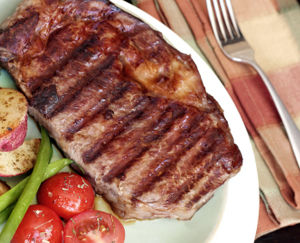Gluten Free
What does following a gluten-free diet mean? That you're embarking on an easy diet with a wide range of health-promoting effects. Instead of dwelling on what you’re giving up, consider that you’re going to enjoy a whole new world of delicious food options to meet your special dietary needs. You’ll be eating seasonally, choosing more fresh fruits and vegetables, focusing on meats, seafood, poultry, legumes, lentils, corn, and rice, and discovering fascinating ancient grains such as quinoa, amaranth, and millet. You’ll be able to eat potatoes, eggs, most cheeses, even chocolate (!)—and enjoy them without guilt because you’ll be taking good care of your body. In fact, you’ll probably end up eating—and feeling—better than ever!
Visit this page for more information about living Gluten Free
---
We carry a large variety of gluten free items, the brands listed below represent just some of the offerings we carry















More Diets
- By Jane Hart, MD
Is Too Much Protein Bad for Bones?
Along with well-known minerals like calcium and vitamin D, getting enough protein is essential for bone health. However, since previous studies have found that eating very high amounts of dietary protein may increase the amount of calcium the body excretes, researchers have wondered: can too much protein actually be bad for bone health? A study published in the American Journal of Clinical Nutrition suggests the answer is “No,” reporting that higher dietary protein did not harm bones of premenopausal women.
Women who ate less vegetable protein had lower bone mineral density compared with women who ate more
Eating for strong bones
To explore the link between dietary protein and bone health, researchers enrolled 560 premenopausal women ages 14 to 40 years old and assessed their bone mineral density and the amount and type of dietary protein they ate over 3 years. Results showed:
- The average amount of protein that women ate was 15.5% of energy or calories consumed.
- Women who ate more dietary protein had similar bone mineral density levels as women who ate less. In other words, higher dietary protein did not have a bad effect on their bones.
- Women who ate less vegetable protein had lower bone mineral density compared with women who ate more—another good reason to eat plenty of veggies.
Few women in this study were consuming what is considered the upper limits of the recommended amount of protein that women should consume, which is 35% of total calories. So the authors note that it still isn’t known whether very high amounts of protein may have a poor effect on bone, or what the optimal amounts of protein for bone health might be.
Choose good habits to protect bones
There are a number of important steps a woman can take to optimize her bone health—take a look at these tips:
- Be informed. Talk with your doctor about how to keep your bones healthy throughout all phases of your life, and ask when you should begin having tests to monitor bone mineral density.
- Exercise regularly. Weight-bearing exercises such as walking have been shown to maintain and improve bone density. Try to exercise daily for optimal health.
- Eat a balanced diet. Our bodies and bones need a mix of nutrients that come from a healthy diet, which includes a source of protein, an abundance of fruits and vegetables, legumes, and other basic foods.
- Get your calcium and vitamin D. Talk with your doctor about how much of these nutrients you should be getting in your daily diet or through supplements for optimal bone health.
- Avoid tobacco and limit alcohol. Tobacco and excess alcohol may harm your bones. If you smoke—quit. And limit alcohol to the recommended guidelines of one drink per day for women and one or two drinks per day for men.
(Am J Clin Nutr 2010;91:1311–16)












